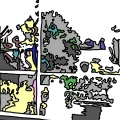Executive Skills
What skills to develop to best hold your role as a manager or leader? What tools to rely on? What subjects to put into practice?

Dare to express your views
Paradoxically, in a business world branded as tough, managers often have a hard time expressing clearly what must be told. It is because this requires a self-confidence that is not always well established. How can you develop this quality?

Joining the leadership team—what are the stakes?
Being appointed to a senior executive position or entering the executive committee sounds like a consecration. But the transition often proves much more difficult than imagined. How can you prepare for this major change?

Improve your personal productivity
Paradoxically, the productivity of business organizations has decreased over the past few years. Thus, our tendency to confuse being busy with being productive leads us to waste 25 to 40% of our working time. How can we gain back these lost hours?

Co-design: Knowing how to dialogue
In a digital era that forces us to be more agile, open and cooperative, the aptitude for dialogue is an essential condition to innovate and adapt. How can you develop your ability to hold constructive team discussions?

Improve the creative dynamic in your teams
Team creativity largely depends on the ability to build on the ideas of others. How can you draw on theatrical improvisation techniques to optimize the quality of creative discussions?

Turn failure into a springboard
Company leaders generally perceive failure as a setback rather than a means to learn and improve. How can you make use of your failures—and help your employees do the same?

Feedback, an uncomfortable but invaluable exercise
Feedback is often an uncomfortable exercise both for those who give it and those who receive it. Yet, it almost always brings useful insights. How can we derive greater benefit from the feedback we receive?

The illusion of objectivity
Reflexive thinking is indispensable to react and make decisions efficiently, but may also distort our perception and ossify our way of thinking. How can we avoid being trapped in our cognitive illusions?

Matters of conscience at the heart of management
How to choose between different options when none of them clearly emerges as being the best? These dilemmas make us face ourselves: What is most important for us? What do we favor? What image of ourselves do we give others?
